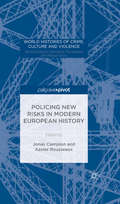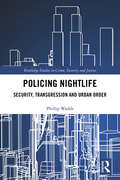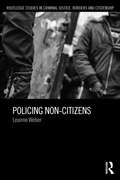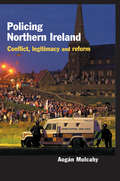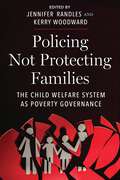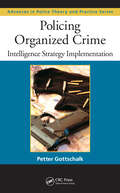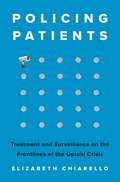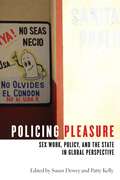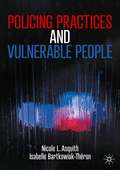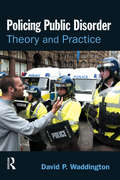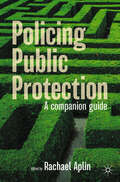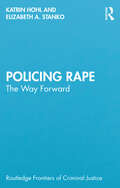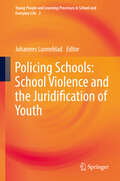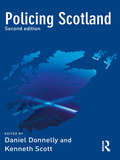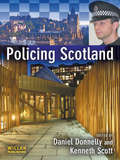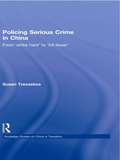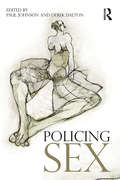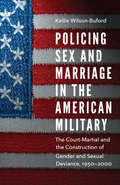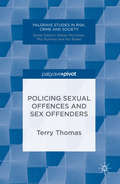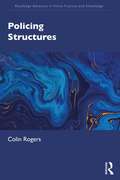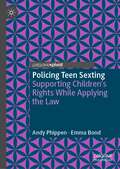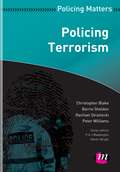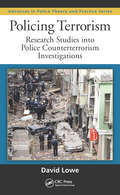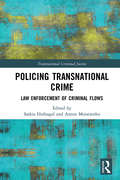- Table View
- List View
Policing New Risks in Modern European History (World Histories of Crime, Culture and Violence)
by Xavier Rousseaux Jonas CampionAuthorities often fear societal change as it implies finding a new balance to live together within society. Whether it is defined by economic, political, social or cultural factors, the transformation of life in society is considered by authorities as a 'risk' that needs to be framed and controlled. The state's response to this situation of transformation can be analysed through the prism of the police. Informally or not, police systems adapt their regulatory frameworks, their structures and their practices in order to respond risks, new threats and new rules. This process, which is mostly of a contemporary nature, is also deeply historic. Analysing it on the long run is therefore particularly relevant. From the late nineteenth-century until the second half of the twentieth-century, Policing New Risks in Modern European History provides a panorama of political and police reactions to the 'risks' of societal change in a Western European perspective, focusing on Belgium, France, and The Netherlands, but also colonial perspectives.
Policing Nightlife: Security, Transgression and Urban Order (Routledge Studies in Crime, Security and Justice)
by Phillip WaddsNightlife is a place of both real and imagined risk, a ‘frontier’ (Melbin 1978) where apparent freedom and transgression are closely linked, and where regulation of leisure and collective intoxication has been diffused throughout an expanding network of state and private actors. This book explores Sydney’s contemporary night-time economy as the product of an intersection of both local and global transformations, as policing comes to incorporate more and more ‘private’ personnel empowered to regulate ‘public’ drinking and nightlife. Policing Nightlife focuses on the historical and social conditions, cultural meanings and regulatory controls that have shaped both public and private forms of policing and security in contemporary urban nightlife. In so doing, it reflects more broadly on global changes in the nature of contemporary policing and how aspects of neoliberalism and the ideal of the ‘24-hour city’ have shaped policing, security and night-time leisure. Based on a decade of research and interviews with both police and doorstaff working in nightlife settings, it explores the effectiveness of policies governing policing and private security in the night-time economy in the context of media, political and public debates about regulation, and the gendered and highly masculine aspects of much of this work. An accessible and compelling read, this book will appeal to students and scholars of criminology, policing, sociology and those interested in understanding the debates surrounding security, policing and contemporary urban nightlife.
Policing Non-Citizens (Routledge Studies in Criminal Justice, Borders and Citizenship)
by Leanne WeberCriminologists are increasingly turning their attention to the many points of intersection between immigration and crime control. This book discusses the detection of unlawful non-citizens as a distinct form of policing which is impacting on a growing range of agencies and sections of society. It constitutes an important contribution not only to the literature on policing but also to the field of border control studies within criminology. Drawing on the work of Clifford Shearing, Ian Loader and P.A.J. Waddington, it offers new theoretical approaches to the study of police powers and practice.
Policing Northern Ireland
by Aogan MulcahyThis book provides an account and analysis of policing in Northern Ireland, providing an account and analysis of the RUC (Royal Ulster Constabulary) from the start of 'the troubles' in the 1960s to the early 1990s, through the uneasy peace that followed the 1994 paramilitary ceasefires (1994-1998), and then its transformation into the Police Service of Northern Ireland following the 1999 Patten Report. A major concern is with the reform process, and the way that the RUC has faced and sought to remedy a situation where it faced a chronic legitimacy deficit. Policing Northern Ireland focuses on three key aspects of the police legitimation process: reform measures which are implemented to redress a legitimacy crisis; representational strategies which are invoked to offer positive images of policing; and public responses to these various strategies. Several key questions are asked about the ways in which the RUC has sought to improve its standing amongst nationalists: first, what strategies of reform has the RUC implemented? second, what forms of representation has the RUC employed to promote and portray itself in the positive terms that might secure public support? third, how have nationalists responded to these initiatives? The theoretical framework and analysis developed in the book also highlights general issues relating to the implications of police legitimacy and illegitimacy for social conflict and divisions, and their management and/or resolution, in relation to transitional societies in particular. In doing so it makes a powerful contribution to wider current debates about police legitimacy, police-community relations, community resistance, and conflict resolution.
Policing Not Protecting Families: The Child Welfare System as Poverty Governance (Critical Perspectives on Youth)
by Jennifer Randles Kerry WoodwardControlling, surveilling, and punishing poor families through the child welfare systemIn a typical year, one in five US children have some interaction with the child welfare system. Countless other families, particularly those who struggle to care for their children due to poverty or economic insecurity, fear child welfare system involvement. Though imagined as a system that protects children from caregivers’ maltreatment, contributors to Policing Not Protecting Families argue that the child welfare system polices and punishes poor parents who are unable to meet white, middle class parenting standards due to structural inequalities.Bringing together scholars from anthropology, sociology, law, and social work, this collection is the first to critically examine the child welfare system’s role in governing poor, disproportionately Black and Native families. It shows that the child welfare system is a key site of poverty governance, or state control and management of poor families. Chapters bring together empirical research from diverse settings across the US, highlighting the system’s interactions with other state systems and its wide impact on marginalized families. Together the chapters illustrate the failure of the child welfare system to protect children and families from the structural inequalities that shape the lives of poor and other marginalized families.
Policing Organized Crime: Intelligence Strategy Implementation (Advances in Police Theory and Practice)
by Petter GottschalkWhen criminal activity is as straightforward as a childs game of cops and robbers, the role of the police is obvious, but today‘s bad guys don‘t always wear black. In fact, the most difficult criminals to cope with are those who straddle the gray divide between licit and illicit activity. Many of these nefarious sorts operate on the fringe of soci
Policing Patients: Treatment and Surveillance on the Frontlines of the Opioid Crisis
by Elizabeth ChiarelloA book that takes you inside the culture of surveillance that pits healthcare providers against their patientsDoctors and pharmacists make critical decisions every day about whether to dispense opioids that alleviate pain but fuel addiction. Faced with a drug crisis that has already claimed more than a million lives, legislatures, courts, and policymakers have enlisted the help of technology in the hopes of curtailing prescriptions and preventing deaths. This book reveals how this &“Trojan horse&” technology embeds the logics of surveillance in the practice of medicine, forcing care providers to police their patients while undermining public trust and doing untold damage to those at risk.Elizabeth Chiarello draws on hundreds of in-depth interviews with physicians, pharmacists, and enforcement agents across the United States to take readers to the frontlines of the opioid crisis, where medical providers must make difficult choices between treating and punishing the people in their care. States now employ prescription drug monitoring programs capable of tracking all controlled substances within a state and across state lines. Chiarello describes how the reliance on these databases blurs the line between medicine and criminal justice and pits pain sufferers against people with substance-use disorders in a zero-sum game.Shedding critical light on this brave new world of healthcare, Policing Patients urges medical providers to reaffirm their roles as healers and proposes invaluable policy solutions centered on treatment, prevention, and harm reduction.
Policing Pleasure: Sex Work, Policy, and the State in Global Perspective
by Susan Dewey and Patty KellyMónica waits in the Anti-Venereal Medical Service of the Zona Galactica, the legal, state-run brothel where she works in Tuxtla Gutiérrez, Mexico. Surrounded by other sex workers, she clutches the Sanitary Control Cards that deem her registered with the city, disease-free, and able to work. On the other side of the world, Min stands singing karaoke with one of her regular clients, warily eyeing the door lest a raid by the anti-trafficking Public Security Bureau disrupt their evening by placing one or both of them in jail.Whether in Mexico or China, sex work-related public policy varies considerably from one community to the next. A range of policies dictate what is permissible, many of them intending to keep sex workers themselves healthy and free from harm. Yet often, policies with particular goals end up having completely different consequences.Policing Pleasure examines cross-cultural public policies related to sex work, bringing together ethnographic studies from around the world—from South Africa to India—to offer a nuanced critique of national and municipal approaches to regulating sex work. Contributors offer new theoretical and methodological perspectives that move beyond already well-established debates between “abolitionists” and “sex workers’ rights advocates” to document both the intention of public policies on sex work and their actual impact upon those who sell sex, those who buy sex, and public health more generally.
Policing Practices and Vulnerable People
by Isabelle Bartkowiak-Théron Nicole L. AsquithThis textbook addresses existing gaps in police research, education, and training, and provides guidance on how to respond to and address the vulnerability that arises in policing practice. It guides students through the conceptual and also the practical issues of managing vulnerability in policing with case studies and practitioners’ views from the UK, Australia, New Zealand, South Africa, the US, Canada, France, and beyond to the Maldives, China, India, Pakistan, and Sri Lanka. It includes key concepts, views from the front-line, further reading and activities in each chapter. Policing Practices and Vulnerable People is aimed at researchers and practitioners working with police. While focussed on democratic policing practices, this book includes case studies and practitioners’ views from a wide range of approaches, including those from the Global South. This book provides readers with a framework that can assist them in converting conceptual knowledge to critical, ethical policing practice.
Policing Public Disorder
by David WaddingtonThis book draws on a wide range of studies of collective conflict and the policing of crowds and social movements to provide an understanding of the causes and management of public disorder. It seeks to describe and explain the processes by which the police interpret and respond to instances of public disorder, to account for variations in their strategies and tactics, and to identify the conditions in which police interventions (or inaction) may serve to enhance or reduce the potential for wider confrontation. In addition to providing a penetrating review and critique of relevant theory, the author employs a combination of existing studies and first-hand research to explore the lessons, both practical and theoretical, of recent examples of British and American urban disorders, the policing of worldwide anti-globalisation protests (such as the British G8 protests of 2005), and the activities of British football fans abroad between 1990 and 2006. These case studies are brought together to provide an engaging and sharply focused explanation and evaluation of contemporary police methods for avoiding or controlling public disorder. Policing Public Disorder will be essential reading for anyone with an interest in policing, crowd behaviour and issues around public order and disorder.
Policing Public Protection: A Companion Guide
by Rachael AplinThis book explores the effective policing of public protection issues, from chapter authors with varied research and practitioner experience. The collection is aimed at detective police officers in specialist units, response and neighbourhood officers, as well as new recruits in policing public protection. Each chapter offers an understanding of victimology, perpetration, and the effective policing and investigation of such crimes. It explores questions such as why crimes happen, who the victims are, what perpetrators do, and why they might target certain victims. This book explores international literature, the evidence base, past mistakes, and what effective and professional policing should ‘look like’. The intention is to improve the policing and investigation of such complex crimes. Each chapter provides a concise summary, a comprehensive literature review, and a list of key actions for practice that officers should consider. It closes with a list of key resources. These chapters specifically cover the following thematic crime areas such as domestic abuse, child sexual abuse, gendered violence, and trafficking. This book also speaks to local authorities (Social Services, Trading Standards), professionals in Education, Health and Probation, academics, and Non-Government Organisations (NGO) in the charitable sector.
Policing Rape: The Way Forward (Routledge Frontiers of Criminal Justice)
by Elizabeth A. Stanko Katrin HohlThe policing of rape is in permacrisis. This book addresses the question of why police investigations continue to fail most rape victim-survivors and puts forward a framework for what policing can do to change this. Low conviction rates and poor victim-survivor experiences are the hallmarks of the rape justice gap. Three decades of research, policy, and legal changes have tweaked rape investigations to alleviate some of their ills; however, for the majority of victim-survivors, the process remains gruelling. Police forces are notoriously resistant to reform, even in the face of rapidly declining public trust. The starting point of this book is the recognition that if we want profound change in policing, we must try something new. To do so, the authors move from asking "What is it about rape that makes it so difficult for police to investigate it well?" to asking "What is it about the police that makes it so difficult for police to investigate rape well?". Policing Rape sets out a practice-oriented theoretical framework for radically and sustainably transforming rape investigations, rape prevention, and the quality of officer engagement with victim-survivors. The authors reflect on the journey of putting this framework into practice within Operation Soteria Bluestone as a step on the path towards a radical transformation of rape policing. This book is essential reading for all those looking to understand and improve the policing of rape.
Policing Schools: School Violence and the Juridification of Youth (Young People and Learning Processes in School and Everyday Life #2)
by Johannes LunnebladThis book examines the global phenomenon of school violence and its wide range of behaviours, from school shootings to minor theft, bullying and sexual harassment. Studying the Nordic countries and taking Sweden as an example and case study, the book discusses key features of sexuality, bullying and cyberbullying, radicalization, and violent extremism. It examines different approaches to school violence and discusses them in relation to political and ideological influences, gender relations, and socio-economic conditions. It presents trends in prevention of school violence, policing the school and dilemmas in educating against violent extremism. Since most of the research in this field has been done in post-industrial democracies such as Australia, the UK and the US, the book contributes to the debate by offering new perspectives on violence in schools from the Nordic countries.
Policing Scotland
by Daniel Donnelly Kenneth ScottThis fully updated and expanded second edition of Policing Scotland takes account of recent developments in Scottish policing and criminal justice against the backdrop of a dynamic political landscape and looming fiscal constraints in public services. The book offers contributions from both academics and practitioners, and not only shows police at work in contemporary Scotland, but also gives some insight into those areas where policing is carried out by non-police people and organisations.It seeks to identify what it is about Scottish policing that is distinctly Scottish, the main characteristics of modern policing in Scotland, how these have developed over the recent past, and what they have become today. In answering these questions, the book analyses policing in Scotland in the context of the new and emerging ideas about the nature, purposes and methods of policing that are developing elsewhere in the world, and seeks to determine how far Scottish policing is maintaining its own traditions, or simply becoming a localised example of wider global trends.The second edition of this popular text introduces new chapters on crime investigation, police unionism, ethnic minorities, policing violence and forensic science, as well as incorporating a major new theme which seeks to explain how those responsible for policing Scotland set about dealing with current issues such as terrorism and organised crime. This book makes a significant contribution to the current debate on policing in Scotland, and as such is an essential text for academics and those interested in policing issues.
Policing Scotland
by Daniel Donnelly Kenneth ScottThis is the first modern book on policing in Scotland and aims to provide an up-to-date and authoritative account of recent developments, taking full account of the impact of devolution and the work of the Scottish assembly. A concern throughout is to look at Scottish policing within a broader UK and comparative context, assessing both differences and similarities with policing south of the border. Contributors to the book are drawn from both academics and practitioners and include chapters on the history and development of policing in Scotland, its structure and organisation, Scottish devolution and policing, the role of policing within the wider Scottish criminal justice system, crime and policing, community policing in Scotland, policing drugs, policing and youth justice, human rights legislation and Scottish policing, and the management of Scottish policing.
Policing Serious Crime in China: From 'Strike Hard' to 'Kill Fewer' (Routledge Studies on China in Transition)
by Susan TrevaskesDespite a resurgence in the number of studies of Chinese social control over the past decade or so, no sustained work in English has detailed the recent developments in policy and practice against serious crime, despite international recognition that Chinese policing of serious crime is relatively severe and that more people are executed for crime in China each year than in the rest of the world combined. In this book the author skilfully explores the politics, practice, procedures, and public perceptions of policing serious crime in China, focusing on one particular criminal justice practice – anti-crime campaigns – in the period of transition from planned to market economy from the 1980s to the first years of the twenty-first century. Susan Trevaskes analyzes the elements that led to the Hard Strike becoming the preferred method of attacking the growing problem of serious crime in China before going on to examine the factors surrounding the failure of the Hard Strike as a way of addressing the main problems of serious crime in China today, that is drug trafficking and organized crime . Drawing on a rich variety of Chinese sources Serious Crime in China is an original and informed read for scholars of China, criminologists generally and the international human rights community.
Policing Sex
by Paul Johnson and Derek DaltonThis collection focuses attention on an important but academically neglected area of contemporary operational policing: the regulation of consensual sexual practices. Despite the high-level public visibility of, and debate about, policing in relation to violent and abusive sexual crimes (from child sexual abuse to adult rape) very little public or scholarly attention is paid to the policing of consensual sexual practices in contemporary societies. Whilst ‘sexual life’ is commonly understood to be a matter of ‘private life’ that is beyond formal social control, this book shows that policing is implicated in the regulation of a wide range of consensual sexual practices. This book brings together a well known and respected group of academics, from a range of disciplines, to explore the role of the police in shaping the boundaries of that aspect of our lives that we imagine to be most intimate and most our own. The volume presents a ‘snap shot’ of policing in respect of a number of diverse areas – such as public sex, pornography, and sex work – and considers how sexual orientation structures police responses to them. The authors critically examine how policing is implicated in the social, moral and political landscape of sex and, contrary to the established rhetoric of politicians and criminal justice practitioners, continues to intervene in the private lives of citizens. It is essential supplementary reading for courses in criminology, law, policing, sociology of deviance, gender and sexuality, and cultural studies.
Policing Sex and Marriage in the American Military: The Court-Martial and the Construction of Gender and Sexual Deviance, 1950–2000 (Studies in War, Society, and the Military)
by Kellie Wilson-BufordThe American military’s public international strategy of Communist containment, systematic weapons build-ups, and military occupations across the globe depended heavily on its internal and often less visible strategy of controlling the lives and intimate relationships of its members. From 1950 to 2000, the military justice system, under the newly instituted Uniform Code of Military Justice, waged a legal assault against all forms of sexual deviance that supposedly threatened the moral fiber of the military community and the nation. Prosecution rates for crimes of sexual deviance more than quintupled in the last quarter of the twentieth century. Drawing on hundreds of court-martial transcripts published by the Judge Advocate General of the Armed Forces, Policing Sex and Marriage in the American Military explores the untold story of how the American military justice system policed the marital and sexual relationships of the service community in an effort to normalize heterosexual, monogamous marriage as the linchpin of the military’s social order. Almost wholly overlooked by military, social, and legal historians, these court transcripts and the stories they tell illustrate how the courts’ construction and criminalization of sexual deviance during the second half of the twentieth century was part of the military’s ongoing articulation of gender ideology. Policing Sex and Marriage in the American Military provides an unparalleled window into the historic criminalization of what were considered sexually deviant and violent acts committed by U.S. military personnel around the world from 1950 to 2000.
Policing Sexual Offences and Sex Offenders
by Terry ThomasSexual offending has become a mainstay item of reporting in our daily newspapers, and television news bulletins. This book offers an account of the policing of sexual offences and the difficulties that confront the police in the investigation of these intrusive crimes. It surveys the breath of sexual offences and examines the reporting of sexual crime and the attrition level that follows. It proceeds by critically assessing the efforts the police are making to overcome these difficulties and the degree to which they are making progress. The book outlines the relatively new police role of policing the convicted sex offenders themselves, who are living in the community and are subject to risk 'management' by the police and the requirements of the sex offender register held by the police. Written by a leading expert, this timely book will be of great interest to scholars of sexual offending and criminal justice.
Policing Space: Territoriality and the Los Angeles Police Department
by Steve HerbertPolicing Space is a fascinating firsthand account of how the Los Angeles Police Department attempts to control its vast, heterogeneous territory. As such, the book offers a rare, ground-level look at the relationship between the control of space and the exercise of power. Author Steve Herbert spent eight months observing one patrol division of the LAPD on the job. A compelling story in itself, his fieldwork with the officers in the Wilshire Division affords readers a close view of the complex factors at play in how the police define and control territory, how they make and mark space. A remarkable ethnography of a powerful police department, underscored throughout with telling on-the-scene vignettes, this book is also an unusually intensive analysis of the exercise of territorial power-and of territoriality as a key component of police power. Unique in its application of fieldwork and theory to this complex subject, it should prove valuable to readers in urban and political geography, urban and political sociology, and criminology, as well as those who wonder about the workings of the LAPD.
Policing Structures
by Colin RogersThis book examines the structures that support the policing organisation internally and externally, including its partners within the criminal justice system. It has been written for students of policing, especially those undertaking qualifications under the new Police Education Qualifications Framework (PEQF), undergraduates who study the police as part of a criminology or criminal justice degree or similar, and those with a general interest in the police organisation in England and Wales. It includes chapters on: The historical context of police structure. Accountability, governance, and control in the police. Local, national, and international police structures. The partnership between the police and the criminal justice system. The future structure of policing. Throughout the chapters are ‘important point boxes’ which emphasise the key parts of each topic. At the end of each chapter are reflective questions, useful websites, and a further reading list, all of which reinforces students’ knowledge and furthers their professional development. Written in clear and direct style, this book will appeal to students of policing, criminology, criminal justice, cultural studies, and law. It is essential reading for students taking a degree in Professional Policing.
Policing Teen Sexting: Supporting Children’s Rights While Applying the Law (Palgrave's Critical Policing Studies)
by Andy Phippen Emma BondThis book explores the policing response to teen sexting – the digital exchange, both consensual and non-consensual, of intimate images among youth peers. With a particular focus in England and Wales, it also considers other international responses and the challenges faced in policing youth practices with legislation being applied beyond its intended scope. It uses the police responses in England and Wales as a case study of the challenges of policy evolving the digital cultural phenomenon and the tensions between enforcing the law, while knowing it’s not fit for purpose, and supporting vulnerable minors. It explores the policy responses that have developed from the problematic legislation and whether these policy interventions have helped or hindered the policing process. It draws in parallels with drugs policy and policing, and brings in progressive, harm reduction approaches in contrast to traditional solutions.
Policing Terrorism (Policing Matters Series)
by Peter Williams Christopher Blake Barrie Sheldon Rachael StrzeleckiThis is an accessible and up to date text for students on police-related degree courses covering a highly topical area of policing. Terrorism has become a major issue for policing during the 21st century, exacerbated by world events, the emerging new terrorism with its global implications, and a growing need to develop effective counter-terrorism strategies. The book provides students with a historical perspective, introduces a number of well established theories relating to terrorism, and considers how the UK has responded by developing a counter terrorism strategy. In a fast-moving area, it captures the latest changes in legislation and government strategy.
Policing Terrorism: Research Studies into Police Counterterrorism Investigations (Advances in Police Theory and Practice)
by David LoweBased primarily upon information from the UK Special Branch Counterterrorism Unit, Policing Terrorism: Research Studies into Police Counterterrorism Investigations takes you through the mechanics of a counterterrorism investigation. A combination of legal and empirical research, this entry in the Advances in Police Theory and Practice book series e
Policing Transnational Crime: Law Enforcement of Criminal Flows (Transnational Criminal Justice)
by Saskia HufnagelAs the threats posed by organised crime and terrorism persist, law enforcement authorities remain under pressure to suppress the movement, or flows, of people and objects that are deemed dangerous. This collection provides a broad overview of the challenges and trends of the policing of flows. How these threats are constructed and addressed by governments and law enforcement agencies is the unifying thread of the book. The concept of flows is interpreted broadly so as to include the trafficking of illicit substances, trade in antiquities, and legal and illegal migration, including cross-border travel by members of organised crime groups or ‘foreign fighters’. The book focuses especially on the responses of governments and law enforcement agencies to the changing nature and intensity of flows. The contributors comprise a mix of lawyers, sociologists, historians and criminologists who address both formal legal and practical, on-the-ground approaches to the policing of flows. The volume invites reflection on whether the existing tool kit of governments and law enforcement agencies is adequate in this changing environment and how it could be modernised, for example, by increased reliance on technology or by reappraising the role of the private sector. As such, the book will be useful not only for academics and practitioners who work on security-related matters, but also more generally to those who are interested in what the near-term future of policing is likely to look like and how the balance between law enforcement on the one hand and human rights and civil liberties on the other can be achieved.
